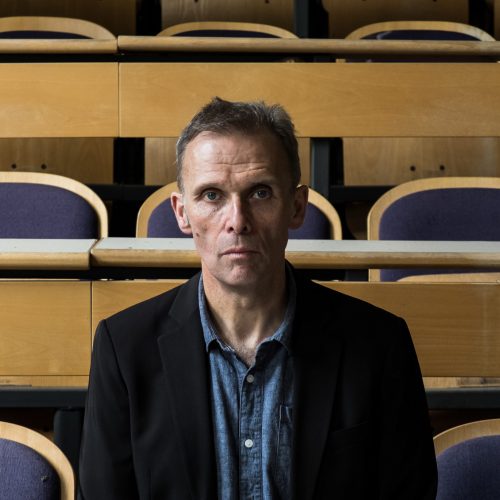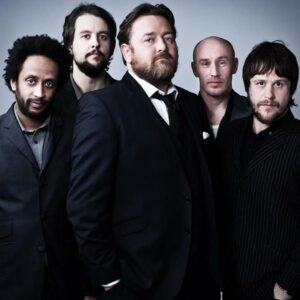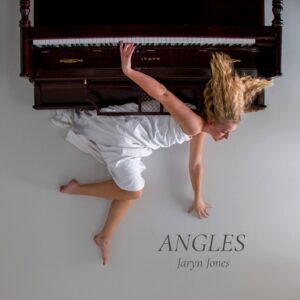Over the course of Cathal Coughlan’s forty-year career, he’s made brooding sophisti-pop alongside future High Llama Sean O’Hagan in Microdisney; he’s made spiky, seething post-punk with Fatima Mansions; he’s released gorgeous, shatteringly sad material under his own name (listen to The Sky’s Awful Blue if you need a good punch to the gut.) But whether he’s influenced by Steely Dan or Einstürzende Neubauten, his songwriting is dense, abstract, frequently caustic, and inimitably brilliant. The average Cathal Coughlan song contains at least one turn of phrase that will make an amateur songwriter throw his moleskine notebook to the ground and jump up and down on it in frustration like Yosemite Sam.
“Song of Co-Aklan”, Coughlan’s first solo release in ten years, is influenced by our current geopolitical situation, which isn’t unusual. Coughlan has frequently engaged with politics throughout his career: autocracy on “Blues for Ceausescu,” nationalism on “Loftholdingswood,” Thatcherism’s casual cruelty on “Only Losers Take The Bus.” Like those songs, “Song of Co-Aklan” rigorously avoids sloganeering, making its point through fragmented dispatches from our slow-motion apocalypse.
“Song of Co-Aklan” uses rich, evocative language to describe a world plagued by hate, corruption, and, well, an actual plague. Coughlan references Zoom calls (“we’ll make a video call when ceilings are falling,”) the 2020 presidential election (“turn on the hysterics for old men without merit,”) and the scapegoating of migrants (“feeling affronted? Blame the unwanted.”) But what separates “Song of Co-Aklan” from other songs about this mess we’re in is that it recognizes what came before it: Coughlan folds in references to the Troubles, the World Wars, and British imperialism, as a reminder that this chaos is nothing new. There has always been stupidity and cruelty, and they will exist for as long as we exist–and if we’re not careful, that might be shorter than we think.
How has your approach to songwriting shifted over time, from Microdisney to Fatima Mansions to your solo career?
I’d be lying if I claimed to have describable or consistent tools and methods for this part of my life, but here goes with a potted history…
In Microdisney, I was very much the guy on the microphone, from the early days in Cork when songs were “jammed out” in what could loosely be called “rehearsals”, onwards into more painstakingly considered writing. My contribution consisted mainly of words, for a few years. Then I began contributing some musical elements, but it wasn’t really the main thing I brought, and my output was intermittent.
When that band came to an end, this all had to change, and in the Fatima Mansions, as a means of operating within the chaos which went with everything we did for the first few years, I took to producing detailed sketches of all the songs. Things could still change a lot in rehearsal or on the road, though, and therein lay the reason why the group worked so well when it did.
It was then that I seriously began trying to get beyond writing songs by means of simply stringing together (what sounded to me like) strong segments. Usually, these could only be played in one way, lest the entire effect disintegrate. A song should, I think, be capable of withstanding any treatment meted out to it, whether by the musicians or the realities of the singer’s life.
That can happen because the amp broke down, or the budget for the recording was very small, or there was only enough interest in the music for one person to be able to travel and play it for people.
I can’t say I’ve always reached that goal, in part because who doesn’t like a nice confected pop or noise record, now and again? Plus, I’m no Gershwin.
But as the Fatima Mansions, like Microdisney, got swallowed up in the kind of business arrangement where those putting up recording budgets wanted to pre-approve every squeak before it was made ready for the public, it became clear to me that there could be no true autonomy unless the songs could be abstracted from the logistics, because honestly, what listener cares about those?
My solo albums are where I’ve tried hardest to hit that goal, and nowhere more than on the Song of Co-Aklan album. Most of these songs have already been through the grinder of what circumstance can do, and so hopefully will persist through whatever is to come.
Where does the title “Song of Co-Aklan” come from? Does it have to do with your name?
Yes it is, although in a refracted way. In fact, a friend of mine kicked the whole thing off by sending me a chunk of text he’d produced by running one of my old lyrics sequentially through various waves of automated translation, and then back into English. Some of it was dead-end verbiage, but some of it was suggestive of completely new meanings, and one of the words which had been “invented” was “Co-Aklan.” Not sure if it did somehow derive from my own name, but I thought, “close enough for jazz.”
I always thought it was quite sappy to start using my own name as an artist name. Earnestness ill becomes me. What better way to announce my lack of interest in belonging in the fake-it-til-you-make-it world of the bound-to-dormancy “heritage act” than by acquiring a new and frankly rather distasteful-sounding name? Now it’s out there, and will grow in frequency of use.
I took to spouting stuff like this, which resonated with other concerns of mine: “Now that Britain expects to culturally and economically turn its back on the western Eurasian landmass and become, in effect, a Pacific nation, its corporate pig-Latin/bog-Frankish nomenclature needs to be ‘updated’ with the use of monosyllables which can be chained together simply, pronounced phonetically, and readily transliterated for use in various global territories – hence, ‘Co-Aklan’.”
Any new venture needs its theme song, and luckily, I had some music which fit the bill.
The lyrics for “Song of Co-Aklan” are dense, complex, and packed with allusions to current events as well as history. What would you say is the single most important line in the song, the line that’s the key to understanding it?
I think this would probably be “Feast your eyes where your money goes to die”.
The low-income nations of the world have well and truly lost their imposed monopoly on corruption-fueled human suffering, on violently polarized social discourse – which of course was never truly confined to those places, but the West’s veneer of stability now lies in tatters. This year, each of us witnesses the suffering and disagreement in action on our literal doorstep, appearing gradually at first, and then…?
Of course, blaming migrants (the clearest and most present victims of our collective failures, as simply evidenced by the journeys they’ve been forced into making) for any of it is inexcusable.
The lyric is a collage, which I’ve tried to make as compelling as possible in a pseudo-narrative which isn’t really narrative at all. That doesn’t equal lack of emotional involvement, and I hope it doesn’t feel arid to anyone hearing it. It’s something of a breakthrough for me, I think. A day-glo horror tableau, with a chorus.
This song is your first solo offering since 2010. How have you spent the past decade?
I’ve never stopped making new music, but a lot of it was either only performed live, or formed parts of collaborations with others. From 2016, though, I began producing songs in such a steady manner, not related to any event or project, that I knew it was building towards either one release or a series of them.
I still wasn’t sure about the “album” as a thing, though, in the current era. I think Bowie’s Blackstar triumphantly closed the book on that, in some ways. Scott Walker’s final two albums opened a new future, built upon but departed from it, just as radically as “Old Town Road” or Childish Gambino, in another part of the forest. And I’m in no way declaring myself the equal of any of those things I just mentioned.
But then, due to various unforeseen issues which prevented me from playing live as I’d intended to begin doing again, I thought I might as well get a dozen or more songs recorded, for whatever use. Then other, more horrible things happened to the whole world, so reality essentially presented me with the option of either finishing those recordings at home and remotely with others, or else losing momentum entirely. I chose to persevere. A cohesion developed, as it sometimes must (songs discarded, others accelerated)! Neither the title track nor the album are what I would term “lockdown projects.”
Do you listen to your older material? How about the music of your past collaborators (Sean O’Hagan of The High Llamas, for instance)?
I listen to my old stuff for work purposes, which happily means that I tend to hear it only enough to learn something from it. The learnings are usually about things I’ve either done pretty well but have forgotten to do recently, or (more often) things that sound half-formed or wonkily-delivered. These reminders are useful, but they only happen if the maker’s exposure isn’t constant, as it might be for better-known artists.
I do listen to Sean’s work, which I greatly admire (and have occasionally guested on). Further out, I always try to hear any new work from semi-contemporaries like the Mekons (who made a fantastic album in 2020), Wire and Einsturzende Neubauten. New music from new artists can be very inspiring and mind-opening, but so can that of people you’ve followed or known, who have done what needed to be done in order to remain productive.
You’ve grappled with politics throughout your career. This song is also political, but compared to those earlier songs it feels simultaneously more direct and more abstract. Was there anything about the current geopolitical situation that you felt warranted a change in approach?
Not very directly. Certainly the changes in the role of music in society – to recorded music being one more component in the world of aircon-like digital media consumption, where the creative intentions and subsistence needs of the creators may easily be ignored, even scorned – caused me a lot of changes of mind over the past decade.
It also parallels the way in which cultural differences within societies and across borders have been fed and incentivized by technology. Hatred for the damage wrought by modern technology, its mendacious apologists and tech-ignorant groupies is, certainly, a big thing for me.
It has inflamed so much that was already wrong in the world, and has given back little, compared to the torment now being unleashed. Look at anything from pandemic denial to the radically-enhanced presence of drone warfare in some very recent conflicts. I won’t be giving back my digital music-making tools, of course, but then, I wouldn’t be as dependent on them if it wasn’t for the craziness being decanted onto humanity elsewhere, from within that same funding ecosystem.
When I started writing the songs which have ended up on this album, I had a change of mind, and thought that recording a series of short songs, inter-related but independent of one another, was a relatively simple way of bucking prevailing trends.
The month I began working in earnest, Brexit was acclaimed by Britain as the answer to its problems. Later that year, America descended into its own void, and my life turned chaotic for various reasons. So it would be hard to claim no influence at all from events like these, given the work was being made as everything went hyper-stupid. But I have no interest in becoming another of those people hitting one another on the head with monopolies of truth, and petty indignation gone ballistic.
As for “Blues for Ceausescu” – the thought strikes me that it’s a lot harder to make those kinds of pro-insurrectionary statements now, in a time where any incursion on the provinces of power is more likely to come in the form of a palace coup, where oligarch replaces flawed democrat, acclaimed by a populace which has fallen for fantasies of purifying conflict – just because it’s simple, and chimes with their own hardships or failed aspirations.







